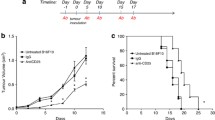Abstract
Recent efforts to treat malignancy using gene transfer have met with varying degrees of success. In this paper, we report the results of studies using two recombinant adenoviral vectors to examine the efficacy of combination gene transfer to cause tumor regression in vivo. One of these vectors encodes the murine MHC class I gene, H-2Kb (ADV-Kb), which induces an immune response that stimulates tumor regression. The second vector encodes the human p21 cyclin dependent kinase inhibitor (ADV-p21). This gene product arrests cell cycle progression and prevents proliferation of tumor cells. Both vectors were tested in a murine model in vivo for antitumor effect. As previously shown, a significant reduction of tumor size was observed with each vector. Combination treatment, in which both vectors were administered, resulted in a trend toward a reduced tumor growth greater than with either vector alone. In order to characterize the mechanism of tumor regression, cytolytic T lymphocyte (CTL) assays against the allogeneic molecule, H-2Kb, were performed. Mice treated with ADV-Kb showed specific CTL activity against the H-2Kb molecule, demonstrating that the immune response against the H-2Kb gene product involved in tumor regression was potentiated by expression of the p21 gene which affects cell cycle progression.
Similar content being viewed by others
Author information
Authors and Affiliations
Additional information
Department of Biological Chemistry, Ann Arbor, MI, USA
Rights and permissions
About this article
Cite this article
Ohno, T., Yang, Z., Ling, X. et al. Combination gene transfer to potentiate tumor regression. Gene Ther 4, 361–366 (1997). https://doi.org/10.1038/sj.gt.3300403
Received:
Accepted:
Issue Date:
DOI: https://doi.org/10.1038/sj.gt.3300403
- Springer Nature Limited
Keywords
This article is cited by
-
Mammalian production of an isotopically enriched outer domain of the HIV-1 gp120 glycoprotein for NMR spectroscopy
Journal of Biomolecular NMR (2011)
-
Design of a muscle cell-specific expression vector utilising human vascular smooth muscle α-actin regulatory elements
Gene Therapy (1999)
-
Comparison of the effectiveness of adenovirus vectors expressing cyclin kinase inhibitors p16INK4A, p18INK4C, p19INK4D, p21WAF1/CIP1 and p27KIP1 in inducing cell cycle arrest, apoptosis and inhibition of tumorigenicity
Oncogene (1999)
-
Immunization for Ebola virus infection
Nature Medicine (1998)




